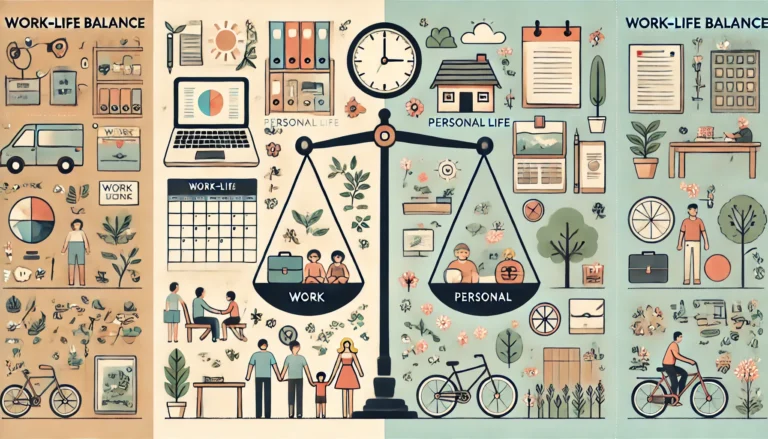In today’s fast-paced world, achieving work-life balance has become a crucial goal for many individuals. The constant pressure to excel in one’s career while maintaining a fulfilling personal life can often lead to stress, burnout, and overall dissatisfaction. A well-balanced life is not just about time management; it’s about understanding your priorities, managing stress, and maintaining harmony between your professional and personal commitments. This post highlights practical tips to achieve work-life balance and offers strategies to ensure a healthier and happier lifestyle.
Why is Work-Life Balance Important?
Work-life balance is essential because it directly impacts your mental health, relationships, and overall well-being. When you strike the right balance, you are more productive at work and enjoy a higher quality of life outside the office. It reduces stress, prevents burnout, and allows you to pursue personal passions and spend time with loved ones.

Read this also: Effective Ways to Relieve Stress and Anxiety
Tips to Achieve Work-Life Balance
- Set Clear Boundaries:
- Create a distinct boundary between your work and personal life.
- Avoid checking emails or taking work calls outside of your designated work hours.
- If you’re working from home, set up a separate workspace to differentiate work from leisure.
- Prioritize Your Tasks:
- Make a daily to-do list and categorize tasks based on urgency and importance.
- Delegate or postpone less critical tasks to avoid overloading yourself.
- Learn to Say No:
- Saying “no” when your plate is already full is crucial for maintaining balance.
- Politely decline additional projects or commitments that could compromise your personal time.
- Take Breaks Regularly:
- Step away from your desk for short breaks throughout the day.
- Consider techniques like the Pomodoro method, where you work for 25 minutes and then take a 5-minute break.
- Adopt a Healthy Lifestyle:
- Incorporate physical activity, a balanced diet, and sufficient sleep into your routine.
- Regular exercise can reduce stress and increase your energy levels.
- Unplug and Reconnect:
- Schedule time to disconnect from all devices and focus on non-work activities.
- Use this time to engage in hobbies, family activities, or relaxation exercises like meditation.
- Communicate Openly:
- Speak with your manager or colleagues if you’re feeling overwhelmed.
- Discuss flexible working hours or remote work options if it helps balance your responsibilities better.
- Plan Time for Yourself:
- Dedicate time for activities that make you happy, such as reading, painting, or pursuing a hobby.
- Regularly set aside “me-time” to rejuvenate and refocus.

Benefits of a Balanced Work-Life Approach
- Increased Productivity: Employees who maintain work-life balance are more focused and productive.
- Improved Mental Health: Reducing work-related stress leads to better mental health and overall happiness.
- Better Relationships: Spending quality time with family and friends strengthens bonds and enhances your social life.
- Higher Job Satisfaction: A good balance helps employees stay motivated and satisfied with their jobs.
Conclusion
Achieving work-life balance is not a one-time effort but a continuous process of evaluation and adjustment. Implementing the tips above can lead to a more satisfying, less stressful life where both your career and personal interests thrive. Remember, it’s okay to step back, reassess, and make changes that contribute to your well-being and happiness. By striking the right balance, you can lead a more fulfilled and harmonious life, reaping the benefits of a healthier and happier you.
You can read more about Work life balance on Wikipedia
Some Images are used from canva.com. You can visit canva.com for more beautiful images and templates.





Pingback: Mental Health and Well-Being: Tips for a Balanced Life - Blogger Bapu
Pingback: Top 5 Government Schemes for Children in India